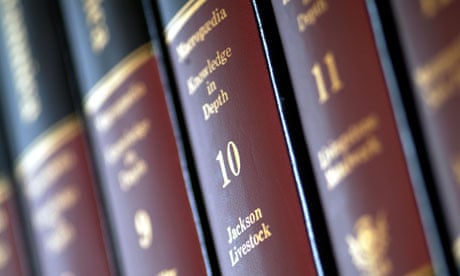Its legacy winds back through centuries and across continents, past the birth of America to the waning days of the Enlightenment. It is a record of humanity's achievements in war and peace, art and science, exploration and discovery. It has been taken to represent the sum of all human knowledge.
And now it's going out of print.
The Encyclopedia Britannica has announced that after 244 years, dozens of editions and more than 7m sets sold, no new editions will be put to paper. The 32 volumes of the 2010 installment, it turns out, were the last. Future editions will live exclusively online.
For some readers the news will provoke malaise at the wayward course of this misguided age. Others will wonder, in the era of Wikipedia, what took the dinosaur so long to die. Neither view quite captures the company or the crossroads.
Jorge Cauz, president of Encyclopedia Britannica, Inc, suggested that the encyclopedia was already something of a relic within the company itself, which has long since moved its main business away from its trademark publication and into online educational tools.
"The company has changed from a reference provider to an instructional solutions provider," Cauz said. He projects that only 15% of the company's revenue this year will come from its namesake publication, mostly through subscriptions and app purchases. "The vast majority" of the remaining 85% of revenue is expected to come from educational products and services, said Cauz, who declined to provide dollar amounts but said the company was profitable.
Encyclopedia Britannica, Inc, is owned by the Swiss banking magnate Jacqui Safra. The company's websites, which include Merriam-Webster dictionaries, attracted more than 450 million users over the course of 2011, according to internal numbers.
If the company's move over the last decade into the education market is an impressive example of corporate versatility, the competitive difficulties the encyclopedia faces are easy to grasp.
Wikipedia English has 3.9m articles. The comprehensive Britannica has about 120,000. Wikipedia is free. The DVD Britannica, which includes two dictionaries and a thesaurus, costs $30 on Amazon. Individuals will also be able to sign up for an annual $70 subscription (universities will be charged about $1 per student).
Cauz said the product was worth the price.
"We may not be as big as Wikipedia. but we have a scholarly voice, an editorial process, and fact-based, well-written articles," Cauz said. "All of these things we believe are very, very important, and provide an alternative that we want to offer to as many people as possible. We believe that there are 1.2 to 1.5bn inquiries for which we have the best answer."
Asked whether the decision to end the publication's monumental run had not caused a backlash inside the company, Cauz said the opposite was true.
"The transition has not been that difficult," he said. "Everyone understands we needed to change. As opposed to newspapers, we felt the impact of digital many years ago – we had a lot of time for reflection. Everyone is very invigorated.
"We are the only company that I know of, so far, that made the transition from traditional media to the digital sphere, and managed to be profitable and to grow."
But what of the kids who will no longer grow up in the beneficent shadow of the physical volumes, or be guided in their learning by happy chance, as when they go looking for "kookaburra" and accidentally encounter "komodo dragon" on an adjacent page?
"I understand that for some the end of the Britannica print set may be perceived as an unwelcome goodbye to a dear, reliable and trustworthy friend that brought them the joy of discovery in the quest for knowledge," Cauz wrote in a company announcement. The product will improve, however, when it finally leaves the space constraints and black-and-white finality of print behind, he said.
"Today our digital database is much larger than what we can fit in the print set. And it is up to date because we can revise it within minutes anytime we need to, and we do it many times each day."




Comments (…)
Sign in or create your Guardian account to join the discussion